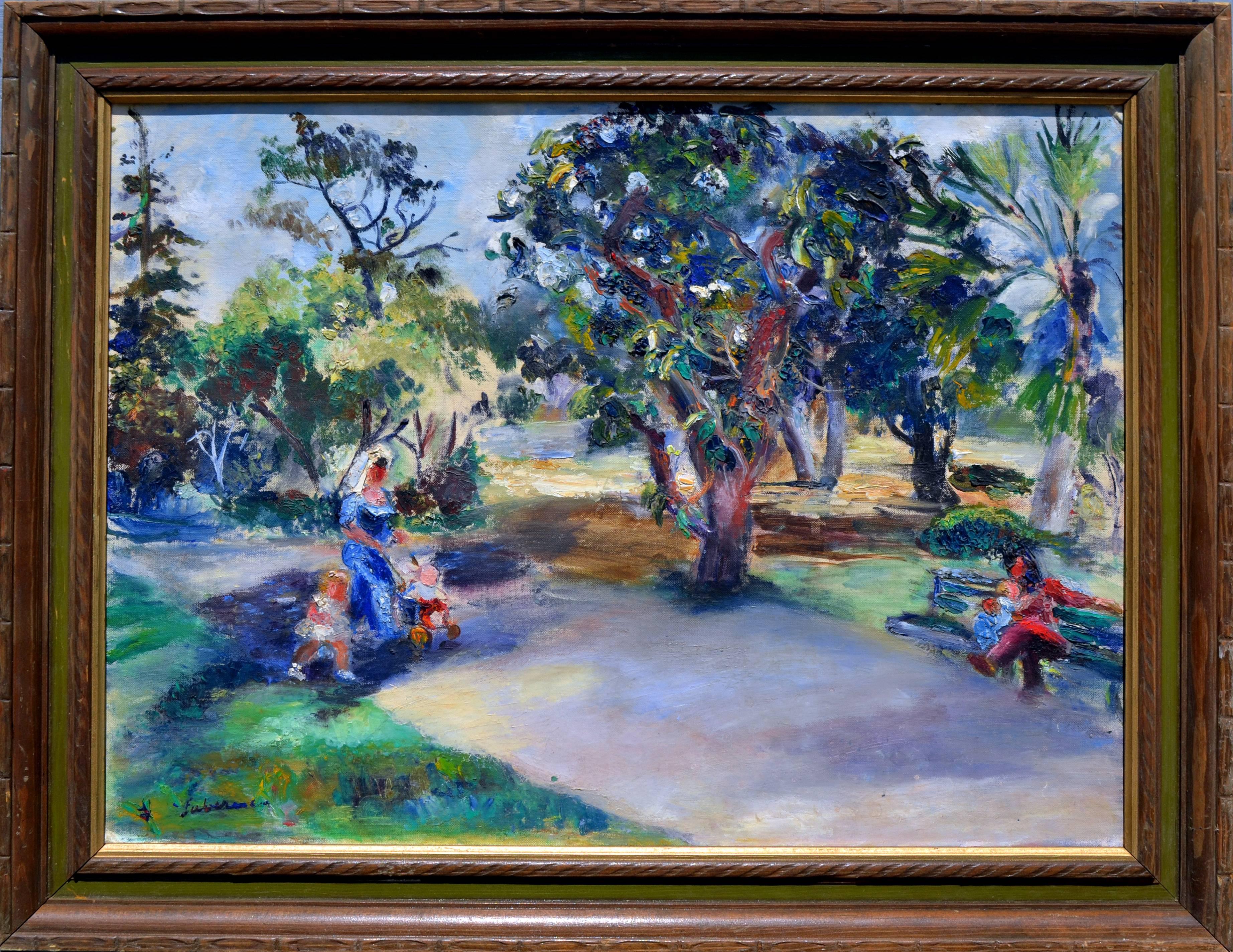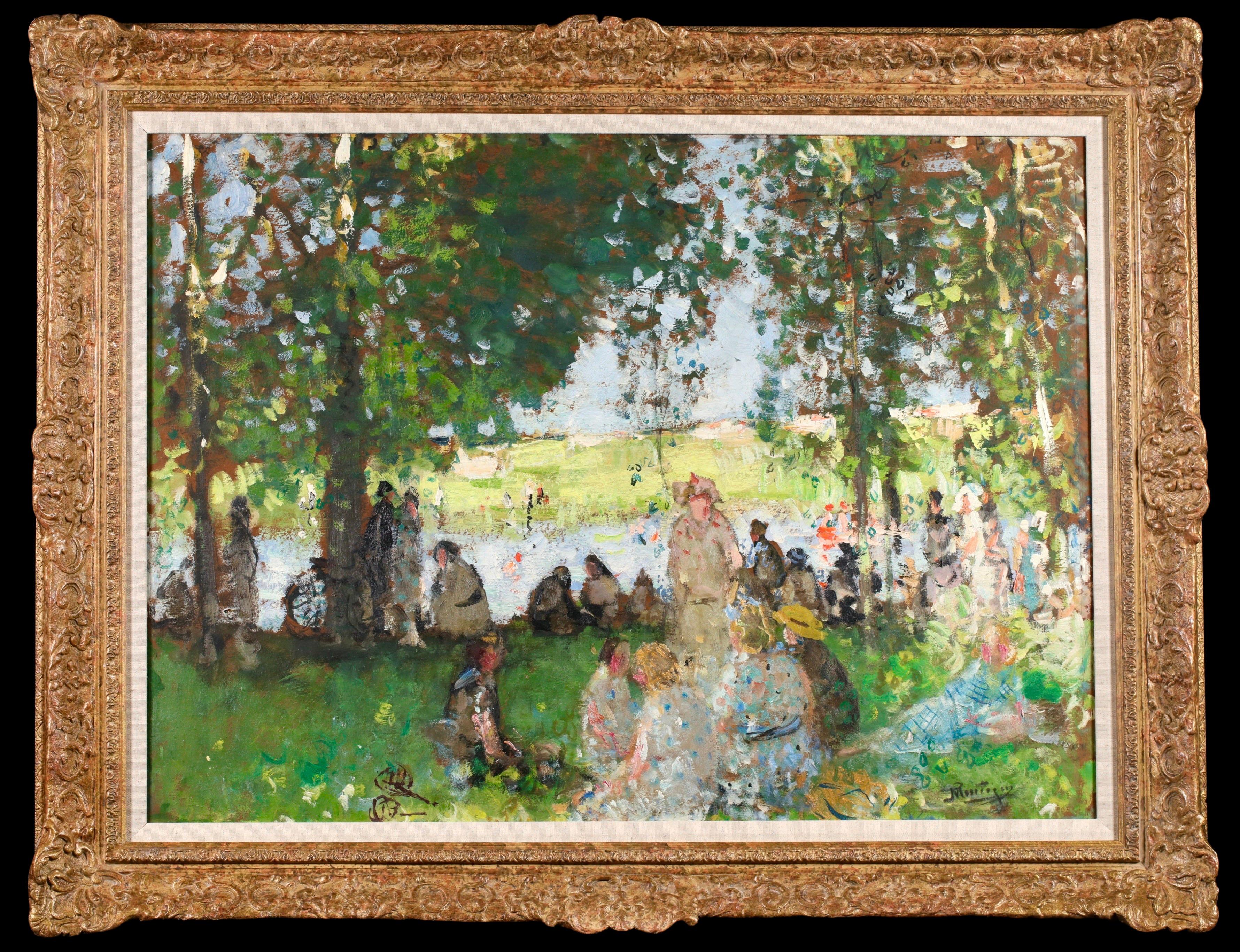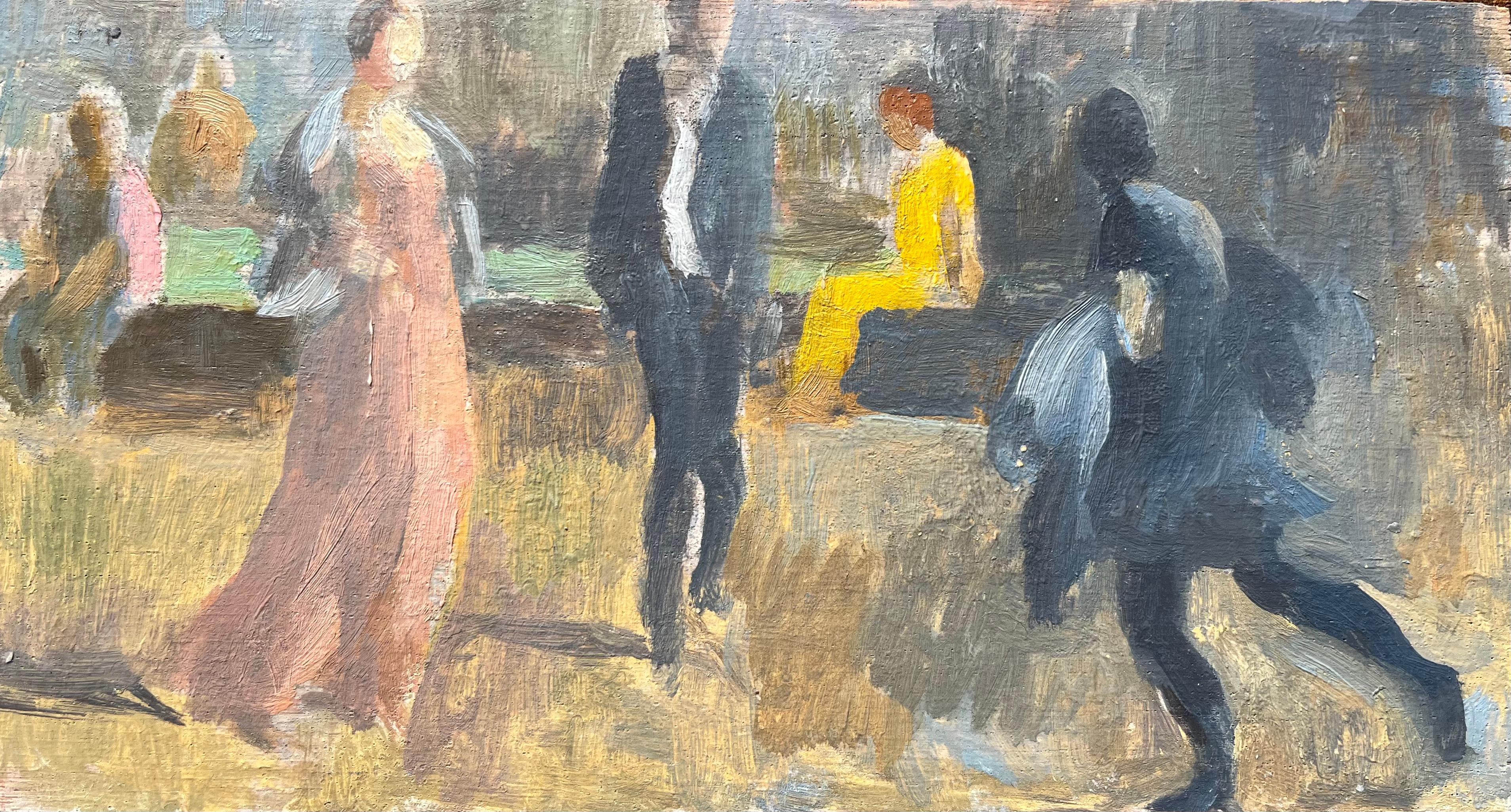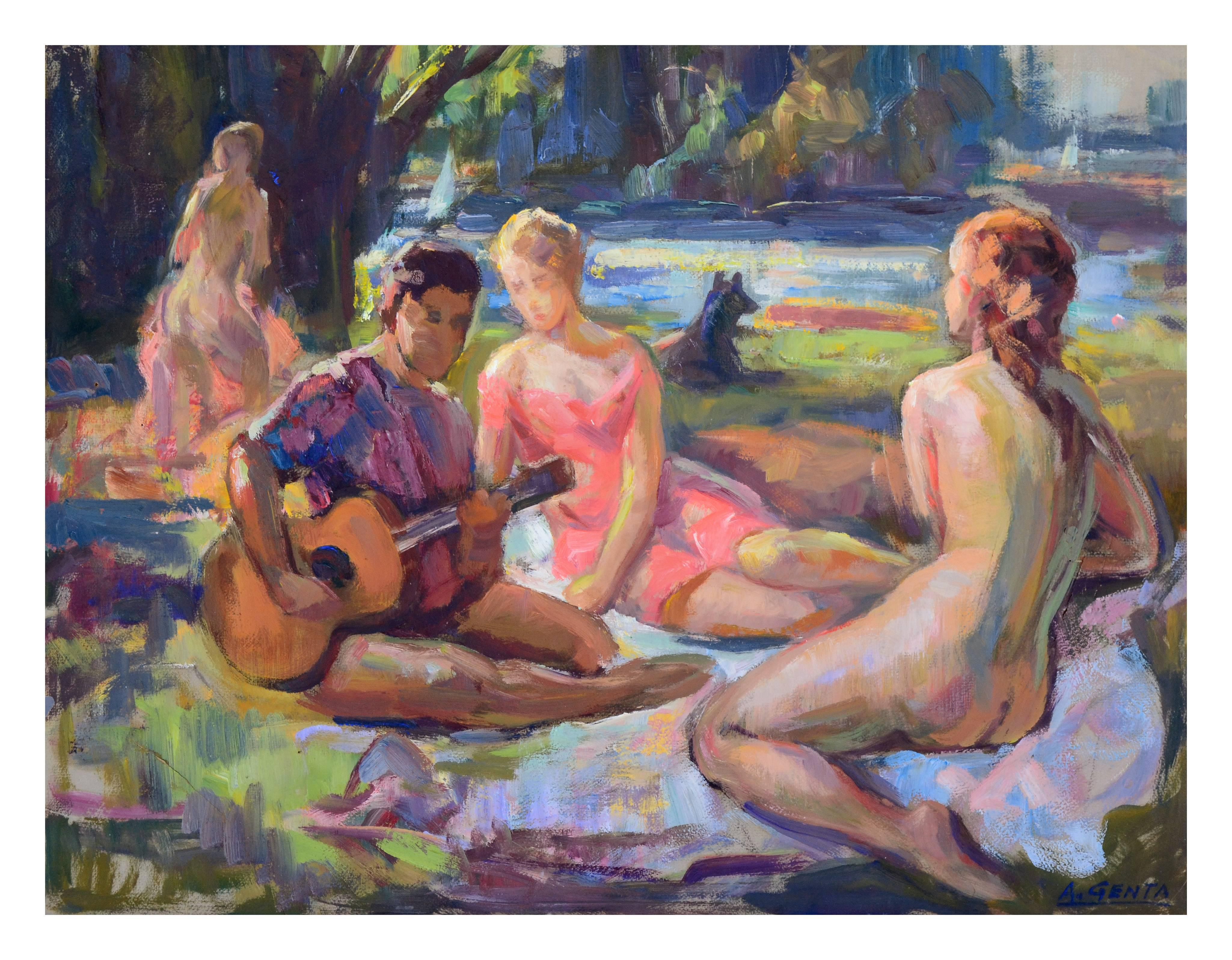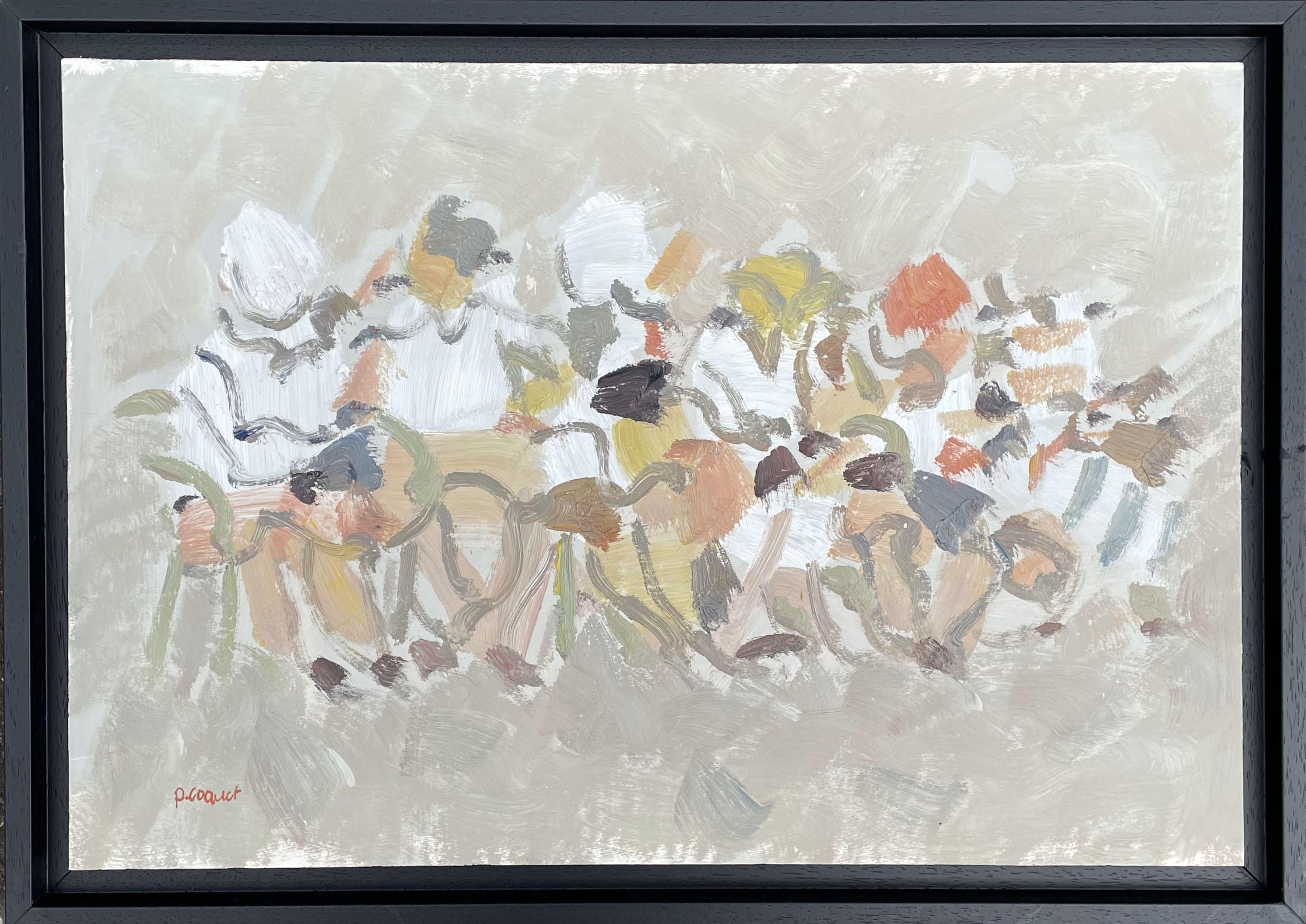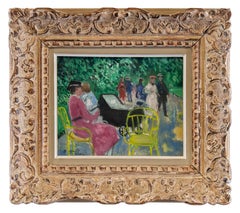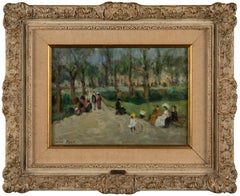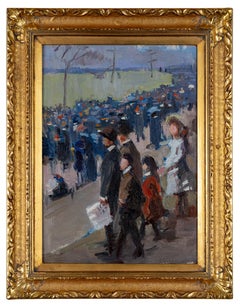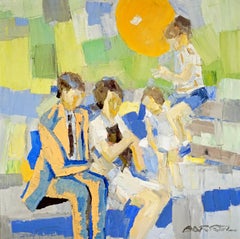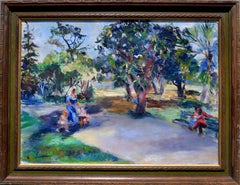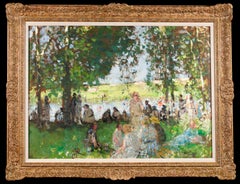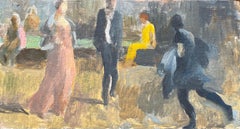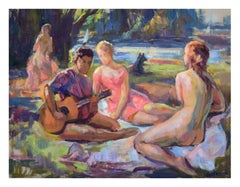Items Similar to Personnages Dans un Parc
Want more images or videos?
Request additional images or videos from the seller
1 of 8
Pierre AnfossoPersonnages Dans un Parc
$4,300
£3,287.61
€3,766.75
CA$6,065.18
A$6,603.43
CHF 3,526.02
MX$79,713.80
NOK 44,328.42
SEK 41,230.59
DKK 28,135.75
About the Item
Pierre Anfosso
French, 1928-2004
Personnages Dans un Parc
Oil on Canvas
15 by 18 in, w/ frame 21 ½ by 24 ½ in
Signed lower left
Pierre Anfosso (1 December 1928 at La Crau - 5 November 2004 in Hyères) was a French painter. He was born in 1928 near Toulon, France. After high school and a science degree, he joined the School of Fine Arts of Toulon in 1948, to study architecture, and then became a student of the painters Eugene Baboulène and Henri Pertus and also became interest in Pierre Bonnard, Edouard Vuillard, and Ivan Puni.
In 1950, with school classmates Gilbert Landlord, Jacques Burois, Ducreux Monique, and Lucien Roy Long, he created the 50 Group exhibiting at the Toulon gallery "La Palette" at the Museum of Fine Arts in Toulon, and at the Biennale of Menton and the exhibition of the Young Mediterranean Painting.
In the years that followed, he participated in numerous solo and group exhibitions and received several prizes for paintings. Over the decades, his interest turned to the painting of Nicolas De Staël and Mark Rothko.
From the 1960s, he was also interested in floral painting, especially Iris. In the 1970s, he and his wife, Monique, created an Iris garden, which is now managed by their daughter, Monique.
- Creator:Pierre Anfosso (1928 - 2004, French)
- Dimensions:Height: 21.5 in (54.61 cm)Width: 24.5 in (62.23 cm)
- More Editions & Sizes:21.5" x 24.5"Price: $4,300
- Medium:
- Movement & Style:
- Period:
- Condition:
- Gallery Location:Sheffield, MA
- Reference Number:Seller: 011741stDibs: LU700315880202
About the Seller
4.3
Vetted Professional Seller
Every seller passes strict standards for authenticity and reliability
1stDibs seller since 2017
56 sales on 1stDibs
- ShippingRetrieving quote...Shipping from: Sheffield, MA
- Return Policy
More From This Seller
View AllWalk in the Park
By François Gall
Located in Sheffield, MA
Francois Gall
Hungarian-French, 1912-1987
Walk in the Park
Oil on canvas
8 ½ by 11 in, w/ frame 15 ¾ by 17 ¾ in
Signed lower left
Francois Gall, Hungarian by birth, became a natura...
Category
Mid-20th Century Impressionist Paintings
Materials
Oil
Jardin des Tuileries
By Gabriel Spat
Located in Sheffield, MA
Gabriel Spat
American, 1890-1967
Jardin des Tuileries
Oil on board
8 ⅛ by 11 ⅛ in, w/ frame 13 ¾ by 17 in
Signed lower left
Gabriel Spat spent most of his career in France painting...
Category
Early 20th Century Expressionist Landscape Paintings
Materials
Oil
Day at the Races
Located in Sheffield, MA
Gertrude Fiske
American, 1879-1961
Day at the Races
Oil on Canvas
10 by 14 in, w/ frame 14 by 18 in
Fiske (1879-1961) was a Boston School Painter, a...
Category
Mid-20th Century Expressionist Paintings
Materials
Oil
Family in a Park
By Italo George Botti
Located in Sheffield, MA
George Botti
Italian, 1923-2003
Family in a Park
Oil on canvas
36 by 36 in. W/frame 42 by 42 in.
Signed lower right Barrel
George Botti was born on 2...
Category
1960s Contemporary Figurative Paintings
Materials
Oil
Walk by the River
Located in Sheffield, MA
Alphonse Léon Quizet
French, 1885-1955
Walk by the River
Oil on board
23 ¾ by 28 ¾ in, w/ frame 32 ½ by 38 in
Signed lower right
Alphonse Quizet was ...
Category
Early 20th Century Expressionist Landscape Paintings
Materials
Oil
Côte d’Azur
Located in Sheffield, MA
Michel Dureuil
French, born 1929
Côte d’Azur
Oil on Canvas
15 by 18 ¼ in, w/ frame 22 ¾ by 25 ¾ in
Signed lower right
Michel Dureuil was born in Paris...
Category
Late 20th Century Expressionist Landscape Paintings
Materials
Oil
You May Also Like
Mid Century Figurative Landscape -- Stroll in the Park
By Frances Beatrice Lieberman
Located in Soquel, CA
Colorful figurative landscape of a woman walking through a San Francisco park with two children, while another woman sits on a nearby bench with a b...
Category
1950s Abstract Impressionist Figurative Paintings
Materials
Board, Oil
$1,516 Sale Price
20% Off
Les Vacances - Post Impressionist Figures in Landscape Oil by Pierre Montezin
By Pierre Eugène Montezin
Located in Marlow, Buckinghamshire
Signed oil on canvas figures in riverscape circa 1910 by sought after French impressionist painter Pierre Eugene Montezin. The work depicts women dressed in summer dresses and sunhat...
Category
1910s Impressionist Figurative Paintings
Materials
Canvas, Oil
20thC French Modernist Oil Painting of Elegant Figures in a Park
By Bernadette Kelly
Located in Cirencester, Gloucestershire
Title: French Impressionist Oil Painting of Elegant Figures in a Park
by Bernadette Kelly (French b. 1933)
Unsigned
Medium: oil painting on board, unframed
Painting size: 4.75 inches...
Category
Late 20th Century Modern Figurative Paintings
Materials
Oil
$842 Sale Price
30% Off
Picnic in the Park - Mid Century Figurative Landscape
By Albert Genta
Located in Soquel, CA
Gorgeous mid century figurative landscape of a a group of figures, sitting on the lake shore with a guitar by Francis Albert Genta (French, 1901-1989), c.1950. Signed "A. Genta" lower right. Unframed. Image size: 18"H x 24"W.
Albert Genta was born in Paris, France in 1901 and is primarily known for painting female portraits and landscapes. Albert Genta (Francis Albert Genta) is a painter French specialist naked , born 13 September 1901 in Paris 12th and died on 5 September 1989 in the 20th, Paris .
He was a female nude painter...
Category
1950s Abstract Impressionist Figurative Paintings
Materials
Cardboard, Oil, Paper
Personnages au jardin du Luxembourg, Paris, original painting by Pierre Coquet
Located in Montfort l’Amaury, FR
Personnages au jardin du Luxembourg, original painting by Pierre Coquet (1926-2021)
Oil on paper laid on a board
Framed with a natural oak floating frame
32 x 48 x 2,5 cm (35 x 51 x ...
Category
1980s French School Figurative Paintings
Materials
Oil
Parc, 1944
Located in Atlanta, GA
Prudent Pohl, known as Zanaroff , born onMarch 24, 1885in Moûtiers and died onJuly 12, 1966(aged 81) in Moret-sur-Loing 1 , is a French landscape painter...
Category
20th Century Abstract Expressionist Landscape Paintings
Materials
Oil
More Ways To Browse
Henri Pertus
Pierre Anfosso
Tea Time Painting
Tomas Sunyol
Tope Fatunmbi
Venetian School Oil Painting
Vintage Bee Painting
Waterloo Painting
William Spencer
Woman In Bath
Women Dancing Painting
19th Century Painting Lovers
Androgynous Figure
April Street
B Gregory
Bird Cage Painting
Clinton Hill
Cream Of Wheat Paintings
